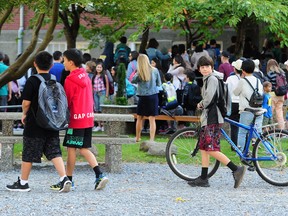Instead of A, B or C, British Columbia now grades kindergarten to Grade 9 students on a scale from ’emerging’ to ‘extending’ — and many parents are confused
Article content
“A’s” are gone from British Columbia report cards, but B.C. parents hoping to gauge their child’s performance find the newfangled “descriptive” grading system confusing, according to a new report.
Last year, the B.C. government scrapped the traditional A, B, C grading system for kindergarten to Grade 9 students in favour of a descriptive grading system that saw student progress judged along a scale from “emerging” to “extending.”
Advertisement 2
Article content
“Parents, by and large, do not understand the new descriptors: emerging, developing, proficient, and extending,” said Michael Zwaagstra, a Senior Fellow at the Fraser Institute.
The report, conducted by Leger for the Fraser Institute, asked parents of school-aged children (ages five to 18) enrolled in public and independent schools across Canada to match “extending” to its B.C. government definition.
In B.C. specifically, 43 per cent of parents made the wrong choice, the highest proportion of any province; extending, per the government’s decision, means “The student is meeting the learning standard expectations with increasing depth. This is not perfection.”
While 83 per cent of Canadians said the letter grade “C” is clear and easy to understand, only 36 per cent of B.C. parents could correctly identify what an “emerging” grade means.
Ninety-nine per cent of B.C.’s K-12 parents said they want clear academic assessments for their child’s report cards.
The new grading system was fully implemented last year after a pilot project, launched in 2016, tested the scale in half of the province’s school districts.
Article content
Advertisement 3
Article content
The system was initially launched as part of a plan to modernize the school curriculum. However, the letter grade system remains for Grades 10 to 12.
Dominique Walker, a parent of three from North Vancouver, said she’s no stranger to confusing grading systems.
In the early 1990s, her younger brother, diagnosed with dyslexia, was in Grade 6 when B.C. was testing its controversial Year 2000 education-reform program. The initiative would slowly phase-in changes designed to update the education system, including letter-grade-free report cards for grades four to seven.
“There was no relative grade,” said Walker. “The grade was: You’re doing well for you. You’re doing great for where you’re currently at.”
If the point of report cards is to provide feedback to parents, then obviously the feedback should be something that is understandable to the average parent
She recalled her mom “ripping her hair out,” trying to figure out whether her kids needed extra help or not in school.
Walker said she shares her mom’s sentiments. “There should be a clear idea of (grading) benchmarks,” she added.
Zwaagstra echoed this perspective.
“If the point of report cards is to provide feedback to parents, then obviously the feedback should be something that is understandable to the average parent,” he said.
Advertisement 4
Article content
Victor Brar, a University of British Columbia professor with expertise in K-12 education, said the descriptive grading system was met with opposition because the traditional letter system is “ingrained into our psychology.”
“It’s the only system that we’ve ever known, (and) you can’t see an alternative,” said Brar. “I think a lot of parents, given this was a system they grew up in, (are) comfortable with it and don’t understand anything different.”
Brar added he thinks it’s a case of “good policy communicated poorly.”
He recommends schools, in September, “call parents into the gymnasium and have a good old-fashioned ‘here’s the system.’”
Brar said the lack of communication has also left students to pick the “new system up on their own,” and match “extending” with “A’s.”
Across Canada, academic grading typically varies by province, level of education and institution, but mostly follows a letter and percentage system.
However, Ontario public elementary and secondary school students receive, in addition to a traditional letter and percentage, a “level” to mark their progress. There are four levels, each corresponding to a letter and percentage range.
Advertisement 5
Article content
Level four, according to the Ontario ministry of education, “identifies achievement that surpasses the provincial standard” and represents an “A” range, or 80 per cent and above.
Level one represents “achievement that falls much below the provincial standard” and signifies a “D” range, or between 50 and 59 per cent.
B.C. Education Minister Rachna Singh previously said the new system is intended to help students better understand each subject, “instead of just striving to get a good grade.”

Parents, said Brar, need to “reorient their thinking” on the grading system. “We’re looking for mastery of competencies,” he said. “If you put it to students and parents that way, I think the adoption and the acceptance would be much greater.”
Walker appreciates that the province is trying to avoid discouraging students with traditional letter grades, “but at the same time, eventually life is gonna grade you.”
“The A or B grade, the extending or non-extending, whatever,” said Walker. “It just feels like another way of trying to say the same thing.”
The B.C. government has tried to distance the proficiency scale from the traditional letter grade system; a government infographic says that “extending” is not synonymous with perfection and “emerging” is not synonymous with failing.
Advertisement 6
Article content
In Walker’s view, this differentiation barely receives a passing grade.
“My daughter has said multiple times after bringing home an (assignment), ‘I got ‘extending’ on this so I’m getting an A.’ In her brain, she’s just translating it as well,” Walker said.
The Fraser Institute study comes after John Rustad, B.C. Conservative Party leader, criticized NDP Leader David Eby for the province’s decision to axe letter grades, calling the system “woke nonsense.”
Rustad said Eby’s decision “has left parents in the dark about their kids’ progress.”
By creating descriptive grades, “you’ve now created a barrier for parents,” said Zwaagstra, who emphasized the advantage of the traditional letter grade system.
With A’s and B’s “you can take a quick look and you immediately have an approximate idea of how your kid is doing,” he said.
“When you have these descriptors, you have to interpret them.”
A 2021 report by B.C.’s ministry of education that surveyed more than 4,000 people before the change found that 69 per cent of respondents were dissatisfied with the idea.
More than half of teachers reported low satisfaction, while 60 per cent of parents and 83 per cent of students didn’t approve of the concept.
Advertisement 7
Article content
After Singh gave the go-ahead, the move was immediately met with anxiety and opposition from some parents and teachers.
Zwaagstra said consultations were the correct thing to do, “but they ignored the results, which completely undermines the point.”
Singh’s office did not respond to a request for comment.
Recommended from Editorial
Our website is the place for the latest breaking news, exclusive scoops, longreads and provocative commentary. Please bookmark nationalpost.com and sign up for our newsletters here.
Article content









